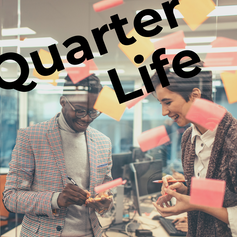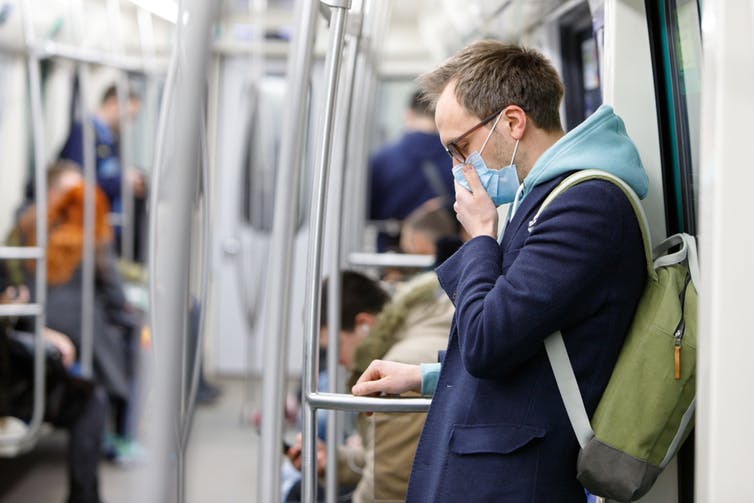
ilze kalve/Shutterstock
We are all tired of COVID. But even though the news has moved on to other concerning geopolitical issues, it is a fact that COVID is still very much with us. Vaccines have certainly helped drive down its worst effects, but the disease is here to stay, and we must learn to live with it.
So what should you do now if you get COVID? Anecdotally, many people seem to be ignoring the virus and carrying on regardless. This is perhaps not surprising given the end of self-isolation requirements in England, with Wales set to lift them very soon too. The message seems to be that COVID is no longer so important. But even as the rules do relax, living with COVID must not mean ignoring it.
Here are five things that COVID has shown that we need to do, especially as cases are yet again increasing and new variants like deltacron continue to be discovered.

Working to make a difference in the world but struggling to save for a home. Trying to live sustainably while dealing with mental health issues. For those of us in our twenties and thirties, these are the kinds of problems we deal with every day. This article is part of Quarter Life, a series that explores those issues and comes up with solutions.
More articles:
Would you bring your dog to a shop? Why retailers should be more pet-friendly
News of war can impact your mental health — here’s how to cope
How your colleagues affect your home life (and vice versa)
Table of Contents
1. Be alert and stay away from others
Colds and respiratory illnesses are quite common, especially during the autumn, winter and spring months. For the majority of people, they are an inconvenience and not harmful.
But the older you get, the riskier they become. So even if you are young and at low risk, there are plenty of people who might get very ill if you give them COVID. Likewise, there are plenty of people with complex health conditions who are at high risk of getting severely ill if they catch the coronavirus. COVID can also trigger life-changing conditions such as type 1 diabetes in people who are susceptible but otherwise apparently healthy.
So if you start to feel ill, rather than carrying on regardless, acknowledge the infection. Look at your diary and reschedule events where you will come into contact with lots of other people. Take advantage of flexible working opportunities if available. The sicker you are, the more you should stay away from others, as this is the best way to stop the virus spreading (although clearly seek medical help should you need it).
Your employer should respect this, as even in England, where self-isolation is no longer legally enforced, government advice is still to self-isolate if you have tested positive or have COVID symptoms. You can use the NHS website to get an isolation note following a positive PCR test should you need to provide evidence.
2. Treat illness with respect
If you are the “carry on regardless” type, you may also be quite active and used to exercising. But if you sense you’re getting ill, give your body a break.
Even after a mild COVID case, doctors recommend waiting until you’re over your sickness before exercising and easing back in gradually. Some experts believe that rushing back to exercise too quickly may raise the risk of developing post-exertional malaise, a symptom of long COVID.
When living a fast-paced life, it can be difficult to slow down. But sometimes a day or two in bed and then returning to exercise slowly can be the main factor in preventing longer-term ill health.

Antonio Guillem/Shutterstock
3. Wash hands, cover face
As children, we are trained to wash our hands often, so the COVID advice to keep good hand hygiene was perhaps not a surprise. However, people’s response to wearing face masks was far more complex.
Face masks are particularly important if you have a respiratory infection like COVID because they stop you spreading germs over other people, much like covering your mouth when you cough or sneeze.
If you are suspicious that you are developing COVID, or even just a cold, wear a face mask if you have to be around other people. Face coverings are far more socially acceptable in western nations than they were prior to COVID, and people will thank you.
4. Stay up to date with vaccines
During childhood, vaccines are taken care of for you, but as an adult it is very easy to let your vaccinations lapse, especially if they are not explicitly required for your profession. For example, prior to COVID annual flu vaccines were increasingly being offered, but uptake was generally quite low.
It is possible that annual COVID vaccinations could be offered moving forward. If they are, it would be wise to take advantage of this, even if you’ve had COVID, because the virus will mutate and previous immunity will wane over time. Vaccines have been, and will continue to be, our best defence against COVID.
5. Think about the long term
Very few of us can drop everything and hide for ten days should we become ill. Work and caring responsibilities in particular can be difficult to avoid. But over the medium to long term, our health and that of our families or colleagues is more important than missing a couple meetings, sports activities or a holiday.
If you think back over time, it is amazing how many “critical” activities turned out to be not quite so important as they felt at the time. Unfortunately, illness is a part of life. Come to terms with the idea that plans can, and do, change.

DimaBerlin/Shutterstock
These five points probably sound a lot like common-sense behaviour. However, one fascinating aspect of ethics is that people refer often to “common sense”, but almost always in the context of accusing other people of not having it – suggesting sense might not be quite as common as the phrase suggests.
On the contrary, evidence from the last few years suggests that many people won’t follow this advice. Sadly, this means that people will continue to get severely ill and die from COVID and other preventable diseases.
![]()
Simon Kolstoe is the independeny chair of UKHSA's Research Ethics and Governance Group.





























